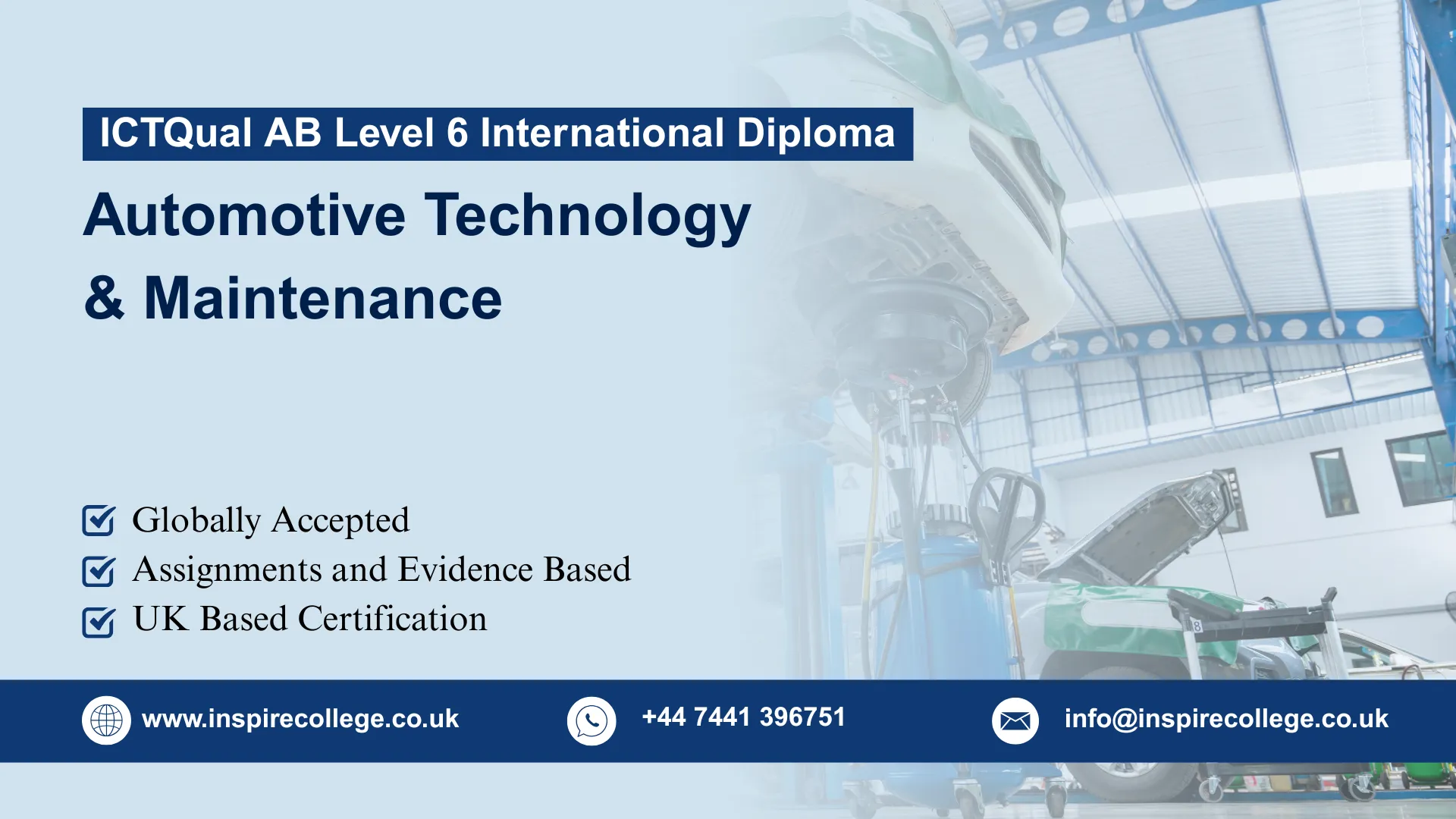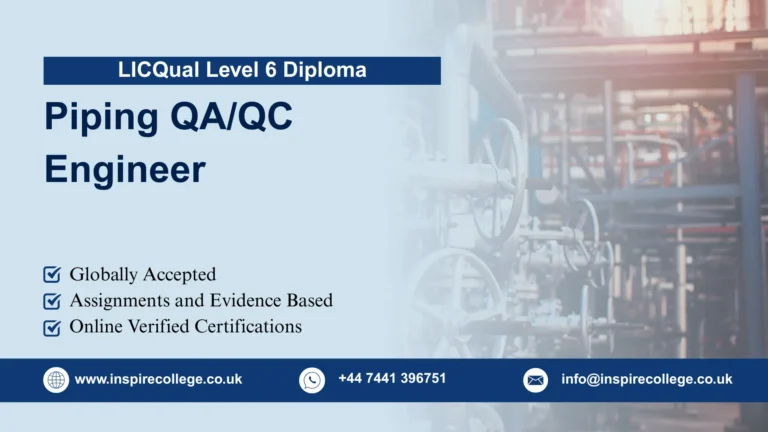
ICTQual AB Level 6 International Diploma in Automotive Technology & Maintenance
The ICTQual AB Level 6 International Diploma in Automotive Technology & Maintenance is a comprehensive three-year programme designed for aspiring automotive professionals and industry practitioners seeking advanced expertise. With a robust 360-credit structure, this internationally recognised diploma equips learners with the technical skills, practical knowledge, and professional insights required to excel in the rapidly evolving automotive sector.
Whether you are a fresh graduate aiming to enter the automotive industry or an experienced professional looking to enhance your career prospects, this diploma provides a structured pathway to success. Learners will gain in-depth understanding of modern vehicle technologies, diagnostics, maintenance procedures, and automotive systems management, alongside critical problem-solving and analytical skills essential for today’s automotive workplaces.
Graduates of this programme will be well-prepared for diverse roles, including automotive service engineer, vehicle maintenance supervisor, fleet manager, and technical consultant, across local and international markets. Beyond technical proficiency, the diploma emphasises industry standards, safety protocols, and sustainability practices, ensuring learners are fully aligned with contemporary automotive practices and global regulations.
Completing the ICTQual AB Level 6 International Diploma in Automotive Technology & Maintenance offers tangible benefits, including enhanced employability, career advancement opportunities, and the professional credibility associated with an internationally recognised qualification. With a combination of theory, practical applications, and real-world case studies, learners emerge as highly competent professionals ready to make an immediate impact in the automotive industry worldwide.
To enrol in the ICTQual AB Level 6 International Diploma in Automotive Technology & Maintenance, applicants must meet the following criteria:
- Age Requirement: Minimum age of 18 years at the time of enrolment.
- Educational Background:
- Applicants should have completed Level 5 Diploma or equivalent in Automotive Technology, Mechanical Engineering, or a related field.
- Alternatively, candidates with relevant vocational qualifications or equivalent professional experience may be considered.
- Work Experience (if applicable):
- For experienced professionals, a minimum of 3–5 years of verifiable work experience in automotive maintenance, vehicle diagnostics, or related technical roles is preferred.
- Fresh candidates without prior experience are also eligible, provided they meet the educational criteria.
- Additional Requirements:
- Proficiency in English (written and spoken) to effectively engage with course materials and assessments.
- Basic computer literacy for accessing digital learning platforms, submitting assignments, and participating in online modules.
- A strong interest in automotive technology and commitment to completing a three-year, 360-credit programme.
These requirements ensure that learners are well-prepared to benefit fully from the programme, whether entering as a fresher or as an experienced professional seeking career advancement.
Mandatory Units
This qualification, the ICTQual AB Level 6 International Diploma in Automotive Technology & Maintenance, consists of 36 mandatory units.
Year 1 – Foundation and Core Automotive Systems
- Introduction to Automotive Technology
- Vehicle Mechanics Fundamentals
- Engine Systems and Components
- Transmission and Drivetrain Systems
- Automotive Electrical Systems
- Braking and Suspension Systems
- Vehicle Diagnostics and Troubleshooting
- Automotive Materials and Manufacturing Processes
- Workshop Safety and Health Practices
- Introduction to Vehicle Maintenance
- Automotive Tools and Equipment
- Basic Automotive Project Work
Year 2 – Advanced Systems and Maintenance Techniques
- Advanced Engine Diagnostics
- Hybrid and Electric Vehicle Systems
- Vehicle Electronics and Control Systems
- Fuel Systems and Emission Control
- Steering and Suspension Advanced Systems
- Brake Systems – Advanced Principles
- HVAC Systems and Climate Control
- Automotive Testing and Quality Assurance
- Vehicle Maintenance Planning and Scheduling
- Advanced Workshop Practices and Safety
- Automotive Technical Documentation
- Applied Practical Automotive Project
Year 3 – Strategic Management and Industry Applications
- Fleet Management and Vehicle Operations
- Advanced Vehicle Diagnostics and Troubleshooting
- Automotive Project Management
- Sustainability and Environmental Practices in Automotive Industry
- Automotive Legislation, Compliance, and Standards
- Automotive Supply Chain and Parts Management
- Innovation in Automotive Technology
- Vehicle Inspection and Quality Control
- Customer Service and Workshop Management
- Advanced Automotive Repair Techniques
- Research Methodology in Automotive Technology
- Capstone Project in Automotive Technology & Maintenance
This qualification, the ICTQual AB Level 6 International Diploma in Automotive Technology & Maintenance, consists of 36 mandatory units.
Year 1 – Foundation and Core Automotive Systems
Introduction to Automotive Technology
- Understand the fundamentals of automotive engineering and the evolution of vehicle technology.
- Identify the primary components and systems in modern vehicles.
- Explain the relationship between vehicle design, performance, and safety standards.
- Recognise the roles and responsibilities of automotive technicians in various industries.
Vehicle Mechanics Fundamentals
- Demonstrate knowledge of basic vehicle mechanics and operational principles.
- Analyse mechanical systems such as engines, transmissions, and drivetrains.
- Apply mechanical concepts to diagnose simple vehicle faults.
- Develop practical skills for basic mechanical repairs.
Engine Systems and Components
- Understand engine types, construction, and operational principles.
- Identify key engine components and their functions.
- Perform basic inspections and maintenance on engine systems.
- Apply problem-solving techniques to engine-related issues.
Transmission and Drivetrain Systems
- Explain the structure and function of different transmission types.
- Analyse drivetrain mechanisms and their role in vehicle performance.
- Perform basic maintenance and troubleshooting of transmission systems.
- Apply safety procedures when handling drivetrain components.
Automotive Electrical Systems
- Understand fundamental electrical principles in automotive systems.
- Diagnose and repair basic electrical faults in vehicles.
- Use diagnostic tools to assess battery, wiring, and lighting systems.
- Interpret electrical schematics and wiring diagrams accurately.
Braking and Suspension Systems
- Understand the principles and types of braking and suspension systems.
- Inspect and maintain braking and suspension components.
- Diagnose common faults and recommend appropriate corrective actions.
- Apply health and safety standards during repair and maintenance.
Vehicle Diagnostics and Troubleshooting
- Apply systematic approaches to identify vehicle faults.
- Utilise basic diagnostic tools and techniques effectively.
- Record and report diagnostic findings accurately.
- Develop problem-solving skills for routine automotive issues.
Automotive Materials and Manufacturing Processes
- Understand different materials used in automotive production.
- Recognise manufacturing processes and their impact on vehicle performance.
- Select appropriate materials for repairs and maintenance tasks.
- Analyse material properties to ensure durability and safety.
Workshop Safety and Health Practices
- Apply occupational health and safety standards in automotive workshops.
- Identify common workshop hazards and implement mitigation measures.
- Use personal protective equipment correctly.
- Maintain a safe and organised working environment.
Introduction to Vehicle Maintenance
- Perform routine vehicle maintenance procedures.
- Understand maintenance schedules and service requirements.
- Apply preventive maintenance principles to enhance vehicle longevity.
- Record maintenance activities accurately for professional reporting.
Automotive Tools and Equipment
- Identify and use essential automotive tools and equipment safely.
- Maintain tools to ensure longevity and operational efficiency.
- Select appropriate tools for specific maintenance tasks.
- Apply best practices in workshop tool management.
Basic Automotive Project Work
- Plan and execute small-scale automotive projects.
- Apply theoretical knowledge in practical scenarios.
- Demonstrate teamwork, communication, and problem-solving skills.
- Evaluate project outcomes and identify areas for improvement.
Year 2 – Advanced Systems and Maintenance Techniques
Advanced Engine Diagnostics
- Conduct in-depth engine diagnostics using advanced tools and techniques.
- Analyse engine performance and identify complex faults.
- Implement corrective actions for advanced engine issues.
- Document diagnostic processes and results professionally.
Hybrid and Electric Vehicle Systems
- Understand the principles and components of hybrid and electric vehicles.
- Perform inspections, maintenance, and fault diagnosis on hybrid/electric systems.
- Apply safety measures when working with high-voltage systems.
- Analyse the environmental impact of hybrid and electric vehicle technologies.
Vehicle Electronics and Control Systems
- Understand electronic control systems and their applications in modern vehicles.
- Diagnose and troubleshoot electronic faults using diagnostic software.
- Interpret electronic schematics and system diagrams.
- Integrate electronic knowledge into practical maintenance tasks.
Fuel Systems and Emission Control
- Analyse different fuel system types and their operational principles.
- Conduct emission testing and ensure compliance with regulatory standards.
- Troubleshoot fuel delivery and emission control issues.
- Apply environmentally responsible practices during fuel system maintenance.
Steering and Suspension Advanced Systems
- Diagnose and repair complex steering and suspension systems.
- Understand alignment, geometry, and advanced suspension principles.
- Apply preventive maintenance to enhance vehicle safety and performance.
- Document repairs and maintain quality control standards.
Brake Systems – Advanced Principles
- Understand advanced braking technologies, including ABS and electronic systems.
- Diagnose and repair advanced braking system faults.
- Perform routine and preventive brake maintenance.
- Apply health, safety, and compliance standards during maintenance.
HVAC Systems and Climate Control
- Understand the components and operation of automotive HVAC systems.
- Diagnose and repair heating, ventilation, and air conditioning issues.
- Perform preventive maintenance for optimal HVAC performance.
- Apply environmental and safety standards during HVAC servicing.
Automotive Testing and Quality Assurance
- Conduct systematic vehicle testing and quality inspections.
- Analyse test results and identify areas for improvement.
- Apply international quality standards in automotive maintenance.
- Document findings and implement corrective measures.
Vehicle Maintenance Planning and Scheduling
- Develop comprehensive vehicle maintenance schedules.
- Prioritise maintenance tasks based on vehicle usage and condition.
- Implement preventive maintenance strategies.
- Evaluate maintenance plans for efficiency and cost-effectiveness.
Advanced Workshop Practices and Safety
- Apply advanced safety protocols in complex workshop environments.
- Manage workshop operations efficiently while maintaining safety standards.
- Train team members on safety procedures and best practices.
- Monitor and improve workshop safety performance.
Automotive Technical Documentation
- Prepare professional technical reports and maintenance records.
- Document diagnostic processes, repairs, and project work accurately.
- Use digital tools for documentation and reporting.
- Ensure documentation meets industry and regulatory standards.
Applied Practical Automotive Project
- Plan and execute advanced automotive projects.
- Apply technical, analytical, and problem-solving skills in real-world scenarios.
- Demonstrate project management, teamwork, and professional communication.
- Evaluate project outcomes and incorporate improvements.
Year 3 – Strategic Management and Industry Applications
Fleet Management and Vehicle Operations
- Manage fleet operations efficiently and cost-effectively.
- Develop maintenance schedules for large-scale vehicle fleets.
- Monitor vehicle performance and implement operational improvements.
- Apply strategic decision-making in fleet management.
Advanced Vehicle Diagnostics and Troubleshooting
- Diagnose complex vehicle faults across multiple systems.
- Use advanced diagnostic tools and software for problem-solving.
- Develop solutions for high-level maintenance challenges.
- Document troubleshooting processes for professional review.
Automotive Project Management
- Plan, execute, and evaluate automotive projects effectively.
- Apply project management methodologies to automotive operations.
- Manage resources, timelines, and budgets efficiently.
- Communicate project outcomes to stakeholders professionally.
Sustainability and Environmental Practices in Automotive Industry
- Apply sustainable practices in vehicle maintenance and operations.
- Analyse environmental impacts of automotive technologies.
- Implement eco-friendly strategies to reduce emissions and waste.
- Promote sustainability awareness in professional environments.
Automotive Legislation, Compliance, and Standards
- Understand local and international automotive laws and regulations.
- Ensure workshop and maintenance activities comply with legal standards.
- Apply quality standards and best practices across all operations.
- Evaluate compliance risks and implement corrective measures.
Automotive Supply Chain and Parts Management
- Manage supply chains and inventory for automotive parts effectively.
- Analyse procurement processes and vendor management.
- Optimise parts storage, distribution, and cost-efficiency.
- Apply strategic planning in automotive logistics.
Innovation in Automotive Technology
- Explore emerging technologies in the automotive sector.
- Evaluate new systems, tools, and methods for practical application.
- Apply innovative solutions to improve vehicle performance and efficiency.
- Encourage creative problem-solving in professional contexts.
Vehicle Inspection and Quality Control
- Conduct thorough vehicle inspections according to industry standards.
- Identify defects, wear, and compliance issues accurately.
- Implement corrective actions and preventive measures.
- Maintain quality control documentation for accountability.
Customer Service and Workshop Management
- Deliver professional customer service in automotive settings.
- Manage workshop operations, staff, and workflow efficiently.
- Resolve customer complaints and improve service satisfaction.
- Apply communication and leadership skills in professional environments.
Advanced Automotive Repair Techniques
- Perform complex repairs on engine, electrical, and electronic systems.
- Apply precision techniques for high-quality maintenance.
- Troubleshoot advanced mechanical and electronic failures.
- Ensure safety, compliance, and quality throughout repair processes.
Research Methodology in Automotive Technology
- Develop skills in academic and professional research within automotive contexts.
- Apply research techniques to identify industry trends and solve technical problems.
- Analyse and interpret data for practical decision-making.
- Prepare research reports and presentations professionally.
Capstone Project in Automotive Technology & Maintenance
- Plan and execute a comprehensive capstone project demonstrating cumulative knowledge.
- Apply technical, analytical, and strategic skills in real-world scenarios.
- Present findings and solutions effectively to stakeholders.
- Evaluate project success, reflecting on challenges and achievements.
The programme is designed to cater to a wide range of learners, from fresh entrants into the automotive field to experienced professionals seeking career growth. The ideal learners can be grouped under the following categories:
1. Fresh Graduates and Entry-Level Learners
- Individuals aged 18 years or older with a strong interest in automotive technology.
- Those who have completed relevant secondary or vocational education and want to gain internationally recognised credentials.
- Learners eager to build a solid foundation in vehicle mechanics, diagnostics, maintenance, and workshop practices.
- Candidates looking to develop practical skills that align with industry standards and global automotive practices.
- Learners aiming to enter professional roles in automotive workshops, dealerships, or technical service centres.
2. Early Career Professionals
- Technicians or junior engineers in automotive service and maintenance seeking advanced knowledge and qualifications.
- Individuals wanting to specialise in modern vehicle technologies, including hybrid and electric systems.
- Professionals aiming to improve their career prospects, enhance technical competence, and gain leadership opportunities in workshops or fleet management.
- Learners committed to hands-on, practical experience combined with theoretical knowledge for real-world application.
3. Experienced Automotive Professionals
- Technicians, engineers, or managers with 3–5 years or more of work experience in automotive maintenance, repair, or diagnostics.
- Professionals aiming to formalise their skills with an internationally recognised Level 6 diploma.
- Learners looking to progress into supervisory, technical consultancy, or management roles within automotive organisations.
- Individuals seeking to broaden their expertise in sustainability, automotive legislation, supply chain, and innovation in vehicle technologies.
- Professionals focused on long-term career growth and international mobility in the automotive sector.
4. Career Switchers and Automotive Enthusiasts
- Individuals from related technical or engineering backgrounds who wish to transition into the automotive industry.
- Learners passionate about vehicles and maintenance, seeking structured training to develop industry-ready skills.
- Candidates motivated to combine theoretical knowledge with hands-on practice to achieve professional competence.
Key Attributes of Ideal Learners
- Commitment to completing a three-year, 360-credit programme.
- Strong problem-solving, analytical, and technical skills.
- Good communication and teamwork abilities for collaborative project work and workshop environments.
- Willingness to stay updated with emerging automotive technologies and industry standards.
- Dedication to maintaining safety, quality, and ethical standards in all automotive operations.
As an ICTQual AB Approved Training Centre, we offer learners two flexible pathways to achieve the Level 6 International Diploma in Automotive Technology & Maintenance. All learners must register with our centre to enrol and access course materials.
Route 1 – Experienced Professionals
This route is designed for learners with at least 6 years of verifiable professional experience in automotive technology, vehicle maintenance, or related fields. Key features include:
- Submission of evidence of prior work, responsibilities, and achievements demonstrating competence in diagnostics, repair, workshop management, and safety compliance.
- Evaluation of existing knowledge and skills against the diploma’s learning outcomes by our centre.
- Targeted guidance or additional training provided if gaps are identified.
- Successful verification leads to diploma certification without completing all 36 assignments, allowing fast-tracked recognition of professional expertise.
Route 2 – Fresh Learners
This route is for learners without prior professional experience in the automotive sector. Key features include:
- Completion of the full three-year, 360-credit programme, including all 36 assignments, practical assessments, and case studies.
- Assessments structured to demonstrate both theoretical understanding and practical application of skills in real-world automotive scenarios.
- Upon successful completion, learners are awarded the ICTQual AB Level 6 International Diploma in Automotive Technology & Maintenance.
Both routes provide a globally recognised, industry-relevant qualification, enabling learners to:
- Validate their professional experience (Route 1)
- Gain comprehensive expertise to advance their careers in automotive technology and maintenance (Route 2)
Register Now
FAQs for ICTQual AB Level 6 International Diploma in Automotive Technology & Maintenance






